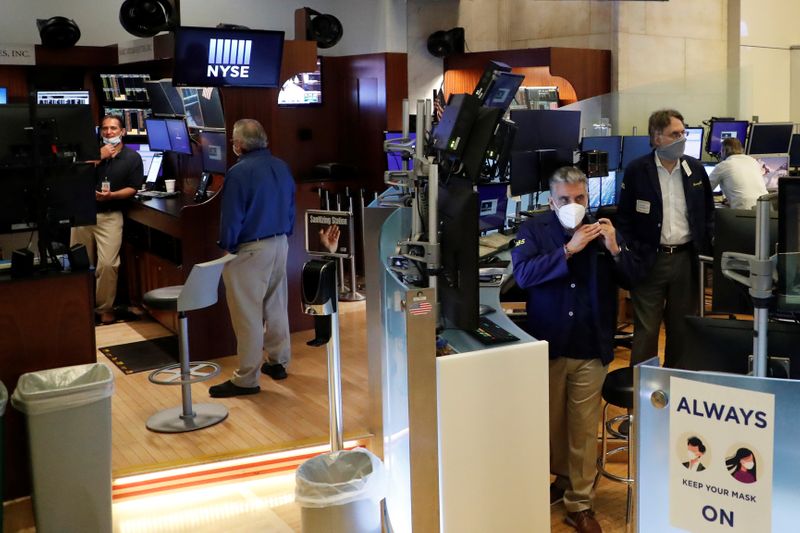NEW YORK (Reuters) – Global equity markets surged on Monday, with the Nasdaq hitting a record high on hopes of a quick recovery from the coronavirus slump, while oil slid after Saudi Arabia said new output cuts by producer nations would not include extra cuts by three Gulf countries.
A surprisingly upbeat U.S. jobs report on Friday drove recovery hopes, along with progress toward a European recovery fund, more German fiscal spending and the European Central Bank’s decision last week to expand its emergency stimulus program.
The Nasdaq closed at a record high, confirming a bull market for the index that began on March 23 when stocks began to pull out of a deep plunge after coronavirus fears threw the U.S. economy into recession and sent markets spiraling downward.
(Graphic: Nasdaq vs S&P 500 – https://fingfx.thomsonreuters.com/gfx/mkt/xklpygleypg/Nasdaq%20vs%20SP.jpg)
The U.S. dollar slid and commodity currencies gained as risk appetite ramped up. The New Zealand dollar rose to its highest in nearly four months after the government said it had stopped transmission of the coronavirus within the country.
The Nasdaq is the first of the Wall Street’s three main indexes to bounce back fully. Financial, automotive and retail-oriented and energy shares – the stocks most beaten-down since the pandemic slammed markets – have been leading equity indices higher recently.
“The majority of investors believe the road to recovery is here,” said Edward Moya, senior market analyst at currency dealer OANDA in New York. “We’re possibly seeing some signs of a much quicker recovery than anyone anticipated. That’s helping push the stock market.”
MSCI’s gauge of stocks across the globe gained 0.95%, while the pan-European STOXX 600 index closed down 0.32% after posting its strongest weekly gain in more than eight years on Friday. Jefferies said in a note that the German market, which fell 0.22%, “has become a tad overbought.”
(Graphic: Wall St vs Main St – https://fingfx.thomsonreuters.com/gfx/mkt/xegpbyengvq/main%20St.jpg)
The S&P 500 ended in positive territory for the year to date.
The Dow Jones Industrial Average rose 461.46 points, or 1.7%, to 27,572.44. The S&P 500 gained 38.46 points, or 1.20%, to 3,232.39 and the Nasdaq Composite added 110.66 points, or 1.13%, to 9,924.75.
Yields on top-rated German government bonds dipped but remained near more than two-month highs hit last week on the back of improving sentiment in world markets.
U.S. Treasury yields also fell, with the 10-year note down 3.3 basis points at 0.8718%. Gold rose after a steep decline, boosted by hopes of a dovish monetary policy outlook from the Federal Reserve after the U.S. central bank ends a two-day meeting on Wednesday.
Investors will be seeking clarity from Fed Chair Jerome Powell on monetary and fiscal policies, Moya said.
U.S. gold futures settled up 1.3% at $1,705.1 an ounce.
Oil fell after the Organization of the Petroleum Exporting Countries and others agreed on Saturday to sustain cuts agreed to in April that were equal to about 10% of global oil supply.
But Saudi Energy Minister Prince Abdulaziz bin Salman said on Monday that the kingdom and Gulf allies Kuwait and the United Arab Emirates would not cut an extra 1.18 million bpd in July as they are doing this month, leading prices to tumble.
U.S. crude fell $1.36 a barrel to settle at $38.19 a barrel, while Brent settled down $1.50 at $40.80 a barrel.
Asia shares rose in a catch-up rally following Friday’s U.S. jobs data but gains were capped by Chinese data, published on Sunday, that showed exports contracted in May.
German industrial output slumped a record 17.9% in April and firms now expect a bumpy road ahead despite a massive stimulus package.
Marija Vertimane, senior strategist at State Street Global Markets, said European shares came under pressure following the weak Chinese data, but “we do not think this marks the end of the rally.”
The Japanese yen strengthened 1.12% versus the greenback at 108.39 per dollar, while the euro was up 0.06% to $1.1291.
The dollar index fell 0.054%.
(Reporting by Herbert Lash and Thyagaraju Adinarayan; additional reporting by Sujata Rao; Editing by Alistair Bell, Nick Zieminski and Dan Grebler)
























